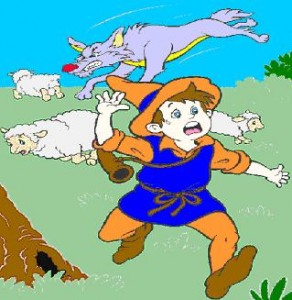When I was a very small child, I had a nasty habit of screaming my head off at the slightest provocation. A slight bump on the head and I would be screeching that it was about to fall off. If I fell over I would sit wailing that I would never walk again.
My mother, who had the complementary foible of worrying herself to shreds over our welfare, often unnecessarily, would drop whatever she was doing and come running. Understandably, she became very weary of my histrionics and introduced me to the fable of the little boy who cried wolf. If I ever actually had a proper, real, life-threatening disaster on my hands, she lectured me, I would be very sorry if nobody believed me and left me to expire in a pool of gore while the vultures circled overhead.
As it happens, she was right. When I tried chopping my finger off in an axe-related incident, I distinctly remember her saying to an irritated and unsympathetic neighbour, “No, actually, Mrs Green, she really has hurt herself this time.” There followed a description of bucketfuls of blood and what she would like to do to the person who had allowed, nay instructed, me to play with an axe. It took a little while to convince Mrs Green that I was not making a fuss about nothing.
At the time it seemed rather harsh of her to be more concerned about my screams upsetting the neighbours and setting off every dog for miles around, than she was that I had grazed my knee or skipped into a brick wall. In hindsight, I can understand her frustration.
When I progressed to infant school, one of the first books I read (Book 4 in the Janet and John series) told the lovely story of Chicken Licken. Like all children, I relished the rhyming names of the principal characters and the repetition of certain sentences. For anyone who might possibly have missed out on Chicken Licken, the basic story is that the chicken is walking along one day when an acorn drops on his head. He completely loses all sense of proportion, assumes that the sky is beginning to fall in, and rallies his farmyard friends to form a deputation to go and tell the King. Any form of poultry that can be forced into a rhyming name follows mindlessly, telling other assorted fowl that the King needs to be informed of the incipient natural disaster. Eventually they meet up with Foxy Loxy, a less gullible individual, who offers to escort them to the palace, and tricks them into becoming a very nice supper for his family. It is not clear what Chicken Licken thought the King would be able to do about the problem. The story convinced me further that making a song and dance about things was not always the most productive course of action.
This lesson, learned early in life, has stayed with me, to the extent that I have at times been accused of not caring enough, because I do not collapse into hysterics at the slightest, or not so slight thing. I suppose I have developed a stiff upper lip, although my bottom lip still pleases itself in moments of high drama. Childbirth? A doddle. Slipped disc? An opportunity for some strong drugs and a well-earned lie down. Flood? Time for a nice paddle, and it was only stuff anyway.
I think this may explain why I get so irritated when people on the interweb get exercised by things that are quite plainly hoaxes, and insist on passing on sob stories and ‘uplifting’ thoughts. I wish that they would just take a moment to think before spreading the alarm or passing on the rumour that someone famous has died, or demanding that anyone with a heart will pass on an overly sentimental tale of heroic soldiers risking everything to rescue an injured earwig in some ghastly war torn place.
I regularly come upon Face Book posts where people who have had enough of such things write something so ridiculous that nobody would believe them for one minute. “Change your privacy settings to stop the internet dragging the earth into a collision course with the sun” “Copy and paste this to everyone everywhere if you care about something trivial. I am watching to see which of you is too heartless to comply, and you will surely die, by the way. Just saying. No offense!”
This is the Molière school of correction: To correct people, make them laugh at their faults. To a degree it might work, but I suspect it merely makes some people feel smug that they are clever enough to be satirical, while the point is lost upon the people at whom it was not really aimed. At best, like-minded people congratulate themselves and each other that they are not contributing to the problem.
But why is it so much easier for us to make oblique and snide comments than it is to address the issue and politely tell people that they are being taken in by cruel pranksters, perpetuating false rumours, and being blackmailed into supporting the modern equivalent of chain letters?
We are so brain-washed into conformity that we would rather pass on the twaddle than be the one who risks unpopularity by saying “Enough is enough!” We don’t want to appear critical or condescending, so we try to make polite excuses for not passing on the umpteenth maudlin demand to share the pain/bravery/heroism.
I am becoming increasingly certain that there is serious harm being caused by these rumours, chain letters and hoaxes. When something really happens that people truly need to know about, or when something crops up that urgently needs to be disseminated, most of us will refuse to take notice. When there is a bona fide appeal for help in a genuine crisis, we will not believe what we are being told. When a genuine threat looms, we shall not be able to tell it from the false alarms. Chicken Licken and the Boy Who Cried Wolf are as relevant today as they ever were.
Please, let’s start saying what we think about these things. Posting condolences before checking that the person concerned has actually died is giving some sick individual satisfaction, and potentially contributing to huge distress for the friends and family of someone you probably don’t even know. Clicking ‘like’ on a freak show picture of a horribly sick or deformed baby will not raise funds for equipment or convey care and concern. Passing on a misinformed medical tip to anyone you know who has a heart condition is irresponsible and dangerous. Alarming everyone on your email contact list with the latest fake virus warning is no help to anyone.
There are resources out there for checking whether internet rumours and advice are fake or not. Let’s copy and paste links to them: if we feel the urge to spread information, we can at least make it something useful!
[P.S. My best friend/kindest critic/husband informs me that I am having a rant and being bossy. I prefer to think that I am expressing an opinion and inviting others to enter a conversation. Whichever you think is nearer the mark, I’d be interested to hear your thoughts. I’d be very interested indeed to hear if anyone who likes receiving forwarded messages and requests could tell me why they like them.]





